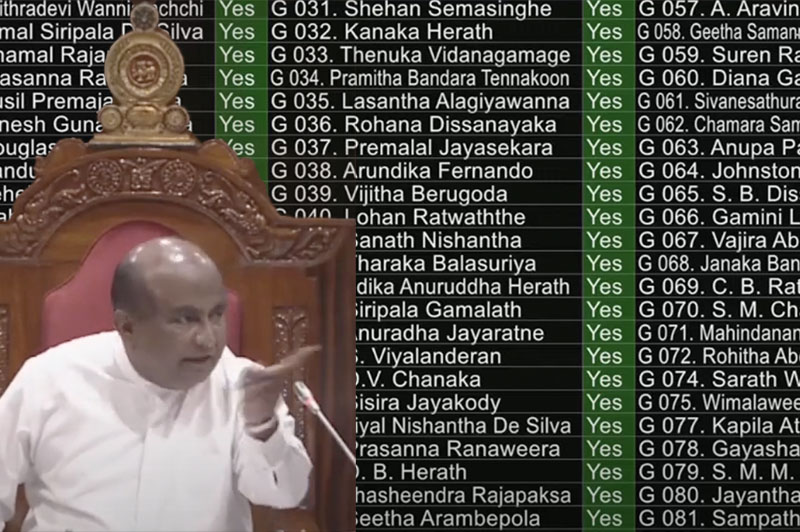The Resolution on Domestic Debt Optimization (DDO) was passed in Parliament with amendments a short while ago (01 July).
Accordingly, the DDO strategy was passed in Parliament with a majority of 60 votes, with 122 votes in favour and 62 votes against.
Meanwhile, the Secretary General of Parliament Kushani Rohanadeera has informed the Secretary to the Ministry of Finance, in writing, that the DDO strategy was passed in Parliament.
A full-day special parliamentary session took place today, during which lawmakers debated the restructuring of local debt, initially proposed in a bid to achieve debt sustainability and economic recovery.
On 28 June, the Cabinet of Ministers unanimously approved the proposed sovereign domestic debt restructuring strategy for restoring sovereign debt sustainability.
Following two days of extensive discussions on the strategy and its impact, the Committee on Public Finance (COPF), chaired by MP Dr. Harsha de Silva on 30 June, gave its approval for the proposed plan, with amendments binding the Finance Ministry to the proposed plan, ensuring adherence to the approved concept paper and addressing concerns about potential deviations.
The Governor of the Central Bank of Sri Lanka (CBSL), Secretary to the Finance Ministry and its officials, creditors including banks, superannuation funds EPF/ETF and insurance funds were invited to the COPF sessions to discuss the matter at length and to hear their views.
In response to questions on the DDO’s impact on superannuation funds EPF, ETF and the guarantee given to ensure 9% interest rates, CBSL Governor Dr. Nandalal Weerasinghe assured that their calculations indicate no net present value loss to the EPF. However, COPF chairman has advocated for legislating a minimum return, as done in the 1958 EPF Act.
Further, concerns were raised about the burden falling on the EPF, the largest superannuation fund in the country, without the consent of the depositors.
The COPF chairman, Dr. Harsha de Silva said the committee members called for balanced burden sharing among all creditors, not entirely on the superannuation funds, in order to uphold equity in the DDO.
Meanwhile, COPF members also raised concerns about the government’s commitment to the proposed plan and adherence to the principles of the resolution. Finance Ministry officials acknowledging these concerns, pledged to strengthen the Fiscal Management Responsibility Act (FMRA) for compliance.
Domestic debt restructuring is a key condition in the International Monetary Fund (IMF) program, through which a bailout package of USD 3 billion was approved for Sri Lanka in March 2023. The IMF program unlocks more help from international funding agencies. Accordingly, the World Bank, earlier this week, approved USD 700 million in financing as budgetary and welfare support for Sri Lanka.
After defaulting on its foreign debt for the time in May 2022, Sri Lanka has been working to get the economy back on track and to meet the conditions set by the IMF. Sri Lanka aims to restructure its sovereign domestic debt before the second IMF review in September 2023 as the release of second tranche of the bailout package due in October would require notable progress on debt restructuring. The island nation received the first tranche to the tune of USD 330 million in March soon after the IMF Board approved the 48-month Extended Fund Facility (EFF).


